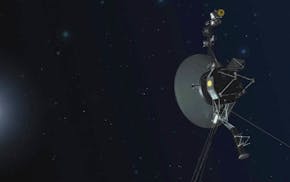NASA's Mars Reconnaissance Orbiter has rediscovered a "lost" British spacecraft that disappeared without a trace more than 11 years ago.
The discovery of the Beagle 2 lander, hailed by planetary scientists, solves a decade-old mystery as to the fate of this missing spacecraft — and may reveal what exactly led to its untimely demise.
Mark Sims of the University of Leicester, who served as the spacecraft's mission manager, expressed "elation that we've found it."
The U.K.-led Beagle 2 hitched a ride to the Red Planet with the European Space Agency's Mars Express spacecraft, with the goal of searching for signs of life on Mars, past or present. On Christmas Day 2003, Beagle 2 entered the Martian atmosphere — and was never heard from again.
It appears that at most, only two or three of the spacecraft's solar panels deployed, Sims said. This was a fatal problem for the lander, given that the radio antenna was packed underneath the solar panels, and would remain blocked until all four solar petals had unfolded into their flowerlike pattern. Without the radio antenna, there was no way to reach the lander, shown below.
Birds migrate as if on roller coaster
If you think riding a roller coaster is scary, how about flying one through the Himalayas? Scientists who tracked bar-headed geese across their seasonal migration have discovered that the birds won't take a straight path to their destination, but instead climb up and plunge down with the contours of the ground.
The findings, published in the journal Science, reveal a surprisingly savvy strategy that helps these high-fliers finish the grueling southbound journey from their breeding grounds in Mongolia to their winter getaway in India or southeastern Tibet.
In one 15.2-hour stretch, the geese repeatedly rose and fell, ascending a total of 6,340 meters (3.94 miles) and descending a total of 4,950 meters (3.08 miles), for a net gain of just 1,390 meters (0.86 miles). Seems like a lot of extra flying for very little gain — but it ends up being the most efficient way to travel. The scientists calculated that if the birds had gradually risen in a straight line to reach those 1,390 meters, it actually would have raised the energetic cost of the journey by 8 percent.
Facebook really knows you
Think your friends know you well? Researchers have developed a computer model that can judge someone's personality more accurately than their friends and family — using nothing but the subject's Facebook activity.
Researchers at the University of Cambridge and Stanford University tested their algorithm on more than 17,000 Facebook users, who provided the researchers with access to their "likes."
Many of their friends, colleagues and family members also completed a survey describing the users.
It needed access to just 10 likes to beat a work colleague, 70 to beat a roommate, 150 to beat a parent or sibling, and 300 to beat a spouse.
The study, published in Proceedings of the National Academy of Sciences, suggests that computers could replace humans in practical settings that require personality analysis, said the lead author, Youyou Wu, a graduate student in psychology at Cambridge. "People are already doing this manually with questionnaires," Wu said, "but in the future, the process could be automated so it could be applied efficiently and reliably."
News services
Minnesota DFL wants faster clean energy permits, but some are wary of shortcutting public input

NASA hears from Voyager 1, the most distant spacecraft from Earth, after months of quiet

The House votes for possible TikTok ban in the US, but don't expect the app to go away anytime soon

Why you should donate clothing: It (probably) won't end up at the dump

